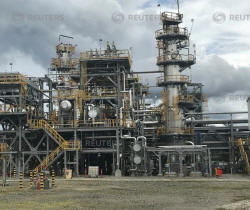Exxon Mobil bets big on China LNG, sidesteps trade war
 Send a link to a friend
Send a link to a friend
 [October 18, 2018]
By Gary McWilliams and Henning Gloystein [October 18, 2018]
By Gary McWilliams and Henning Gloystein
HOUSTON/SINGAPORE (Reuters) - In the middle
of a Sino-U.S. trade war, the world's largest publicly traded oil and
gas company is turning toward Beijing for business at a time when most
of Corporate America is looking elsewhere to avoid the threat of
tariffs.
Exxon Mobil Corp is placing big bets on China's soaring liquefied
natural gas (LNG) demand, coupling multi-billion dollar production
projects around the world with its first mainland storage and
distribution outlet.
Its gas strategy is moving on two tracks: expanding output of the
super-cooled gas in places such as Papua New Guinea and Mozambique, and
creating demand for those supplies in China by opening Exxon's first
import and storage hub, according to an Exxon manager and people briefed
on the company's plans.
That combination "will guarantee us a steady outlet for lots of our LNG
for decades," said the Exxon manager who was not authorized to discuss
the project and spoke on condition of anonymity. One of the company's
top policy goals this year, the manager said, is building its Chinese
client roster.
"China's natural gas demand is rising really fast, with imports soaring
well over 10 percent annually at the moment because of the government
gasification program and due to fast rising industrial demand, including
in petrochemicals," the Exxon manager said.

For a graphic, click https://tmsnrt.rs/2CwGQgT
An Exxon spokesperson declined to provide an executive to discuss the
company's LNG investments in China.
Exxon said last month it would participate in the construction of an LNG
import terminal in Huizhou, Guangdong region and provide supplies to it.
This makes it only the second foreign major with such a stake in an LNG
terminal.
Years in the making, the strategy delivers an added benefit: helping
Exxon sidestep a global trade war. Exxon's massive LNG projects in Papua
New Guinea and Mozambique will not incur the 10 percent tariff China put
on U.S. gas as part of the trade war between the Trump administration
and Beijing.
Jason Feer, head of business intelligence at LNG tanker brokers Poten &
Partners, which tracks LNG sales, said the deal provides "a sign that
China is willing to let foreign interests invest in things that in the
past were seen as strategic."
Exxon is among the top ranked U.S. companies that are pushing ahead in
China despite the trade dispute, but it is not alone. U.S. and European
car makers are opening or expanding China plants to avoid hefty tariffs
and transport costs. Tesla Inc this month acquired a Shanghai site for a
car and battery-manufacturing complex.
Exxon's Asian and African LNG will offer a cost advantage over U.S.
rivals' exports that face tariffs and greater transport, while China's
support for the project offers a rebuttal to Trump administration
complaints about the country's closed markets.
The decision to expand its LNG production and open an import terminal in
the world's fastest growing LNG market is a step by Exxon Chief
Executive Darren Woods to pull the company out of an earnings rut that
has left its shares flat over the past seven years.

TRADE WAR RISKS
Woods appeared holding discussions with Chinese Premier Li Keqiang on
state-run media last month days after disclosing local approvals for the
LNG terminal and a massive chemical project. Since becoming CEO last
year, Woods has pushed Exxon to take greater risks, including in energy
trading operations.
His timing with LNG is key. Next year, China will become the world's
largest importer of natural gas, and its LNG imports are forecast to
rise 70 percent by 2020, from 38.1 million tonnes last year, estimates
Beijing consultancy SIA Energy.
[to top of second column] |

The ExxonMobil Hides Gas Conditioning Plant process area is seen in
Papua New Guinea in this handout photo dated March 1, 2018.
ExxonMobil/Handout via REUTERS/File Photo

Exxon has not publicly named its partner in the import terminal. State-run power
company Guangdong Yuedian Group said on its website it will join the project. BP
Plc is the only other foreign major with a stake in a Chinese LNG terminal.
Yuedian did not respond to a request for comment.
The multi-billion dollar bets still faces risks from the Sino-U.S. trade
dispute. China has vowed to respond to any new tariffs by the Trump
administration, which recently accused China of meddling in November elections
and trying to recruit Americans to spy for it. But it remains unclear what that
response will be and if it puts agreements like Exxon's in China in jeopardy.
In addition to the LNG terminal, Exxon received approval for its first
wholly-owned chemical plant in China, becoming one of two foreign firms
including Germany's BASF to gain approval to operate such plants without a local
sponsor.
The terminal and chemicals plants combined will cost about $9 billion to build,
consultancy IHS Markit estimates.
For a graphic, click https://tmsnrt.rs/2wDdglt
CALL FOR NEW PROJECTS
China in 2017 embarked on a huge program to shift millions of households and
factories from coal to natural gas for power and heating, a move to clear the
smoggy skies over its cities.
That surge has injected new life into an LNG industry that suffered from
plunging prices between 2014 and 2017, which forced energy companies to put off
liquefaction projects.

But with prices for LNG rising this year, major producers have boosted
investment. In addition to Exxon, Royal Dutch Shell PLC this month gave the
go-ahead to a $31 billion LNG Canada project that will export fuel primarily to
China.
"Major Independent Oil Companies such as Exxon aim for large-scale tier one
positions, and in the LNG game that is Qatar, East Africa, and possibly some
North American and Papua New Guinea projects," said Saul Kavonic, oil and gas
researcher for Credit Suisse in Sydney, Australia.
Exxon and other LNG producers also are adapting to changing buyer behavior. In
the past, LNG was dominated by long-term supply contracts - especially with
Japanese and South Korean buyers - that could span several decades and in which
buyer and seller agree to a fixed monthly volume at a set price formula, usually
priced off crude oil.
That is changing, in part because China's importers either demand more contract
flexibility or simply buy LNG at short-notice in the spot market whenever they
need it.
The shift away from such rigid price-supply deals is forcing producers to trade
new LNG supplies and give import terminals a larger role in encouraging spot
purchases.
"LNG players are increasingly adopting an LNG portfolio model whereby supply
projects are not directly linked to end customers, with over 50 percent of
contracts now coming from portfolio suppliers rather than specific projects,"
said Credit Suisse's Kavonic.
(Reporting by Gary McWilliams in Houston and Henning Gloystein in Singapore;
editing by Edward Tobin)
[© 2018 Thomson Reuters. All rights
reserved.] Copyright 2018 Reuters. All rights reserved. This material may not be published,
broadcast, rewritten or redistributed.
Thompson Reuters is solely responsible for this content. |